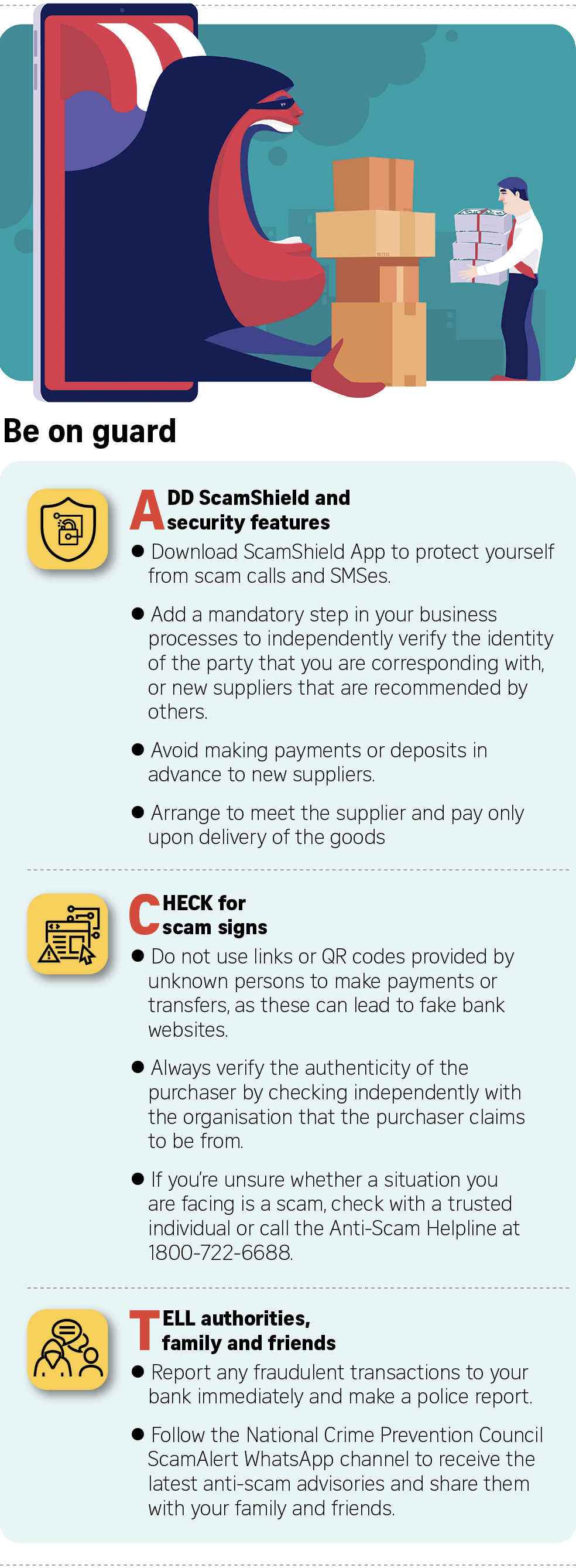BRANDED CONTENT
Here’s how to spot bulk orders from scammers posing as school teachers
At least 60 people fell for fake bulk order scams since April 12, say the police

Scammers would pose as “customers” and contact businesses via call or WhatsApp messages, under the pretext of making bulk orders.
PHOTO: GETTY IMAGES
When digital marketer Steven Lim, 41, received a text from his good friend last month, he had no idea he was about to save his excited buddy a four-figure sum of money.
His friend, wet market flower stall owner Mr Liu, had been contacted by a “teacher” claiming to be from a local secondary school.
Speaking in Mandarin, the “teacher” expressed interest in placing a large order for potted plants to decorate the school’s upcoming graduation ceremony. The order promised a four-figure revenue – an incredible boost for Mr Liu’s small business.
Elated, the 53-year-old, who declined to disclose his full name, shared the good news with Mr Lim immediately. At first glance, “it sounded like a great opportunity”, says Mr Lim.
But the next morning, the “order” took a strange turn.
The “teacher” called again, asking Mr Liu’s help in ordering mattresses for the school dormitories. He also asked for Mr Liu’s bank account number, claiming that he would send him money to pay the supplier.
Soon after, the “teacher” sent a screenshot of an $18,000 bank transfer to Mr Liu, who excitedly shared the exchange with Mr Lim.
Speaking to The Straits Times, Mr Lim explains that his friend is not digitally savvy and at this point, had not suspected anything was amiss.
“But it set alarm bells ringing for me,” he says. An order of this size from public schools would usually be via GeBIZ, the Singapore Government’s e-procurement portal, rather than an “informal” channel like WhatsApp, he notes. “Also, how did a floral order turn into a mattress order?”
Mr Lim decided to call the “teacher” himself to clarify. When he started questioning the sudden change in orders, the call was abruptly cut off.
“It was clearly a scam,” Mr Lim says, adding that he believes the scammer had slipped up by approaching Mr Liu with the mattress order. “That’s what gave (the scammer) away.”
Mr Lim informed his friend immediately, forwarding Mr Liu news reports of similar fake bulk order scams. “He was so angry when he found out it was a scam attempt.”
Know the scam signs
- Unsure about an SMS from the Government?: Since July 1, all SMSes sent from government agencies show “gov.sg” as the sender ID. But when in doubt, here are four vital indicators to verify.
- Guard up against pop-ups: Does it say your computer is compromised? Think twice before calling the “support helpline”, it is likely a technical support scam.
- Good cyber hygiene routine: Want to keep the dirty tricks of scammers at bay? Here are four ways to better protect your data and money.
Share and beware
Mr Liu almost became one of the at least 60 people that fell for fake bulk order scams since April 12, says the police. Total losses: At least $831,000.
The majority of cases involve scammers posing as teachers or staff from academic institutions, says Police Superintendent Rosie Ann McIntyre, assistant director of the Scam Public Education Office Operations Department, Singapore Police Force (SPF).
But scammers may also impersonate buyers from reputable businesses. “(By presenting) an identity or company that potential victims will perceive as authentic, (scammers can make them) lower their guard and gain trust more easily.”
She encourages the public to share news reports of scams with family members and friends, as Mr Lim did. “Your information may help prevent them from falling prey to scams.”
Mr Lim says he’s glad to be able to help his friend escape a scammer’s trap. “I’ve personally seen how (small merchants like Mr Liu) struggled during the pandemic, and their profit margins are small to begin with. Even a few thousand dollars would be a huge loss to them.”
How fake bulk order scams work
- Scammers would pose as “customers” and contact businesses via call or WhatsApp messages, under the pretext of making bulk orders.
- Scammers would typically make bulk orders, asking for additional items or specific brands that the businesses usually don’t stock. The fake orders may also be in quantities that retailers are unable to fulfil on short notice.
- The purported customer would then recommend that the victim buy from a “supplier” (who is also a scammer).
- Scammers may provide screenshots of fake payment documentation to assure the victims that they had made partial payment of the bulk order in advance. This would convince the victims to make upfront payment for the orders placed with the “supplier”.
- Victims would only realise the scam when they do not receive any payment from the “customer”, when the “supplier” does not deliver the goods, or when both “customer” and “supplier” become uncontactable.

This is part of a series titled “Act against scams”, in partnership with the Singapore Police Force.


